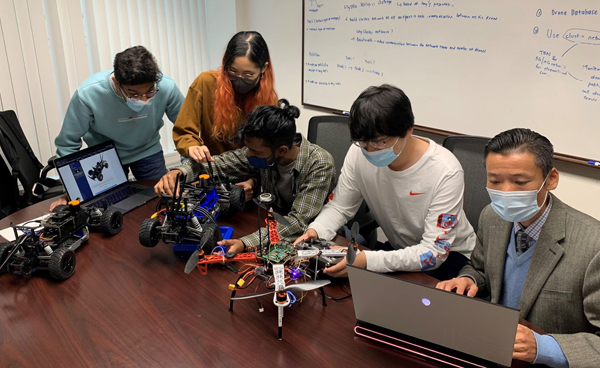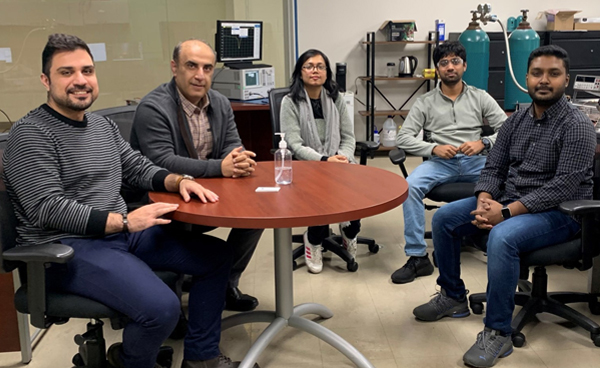Electrical Engineering and Computer Science Research
The Electrical Engineering and Computer Science Department has many research groups, allowing undergraduate and graduate students in Electrical Engineering and in Computer Science Engineering the opportunity to work alongside faculty members on cutting-edge research in our state-of-the-art labs.

The Learning and Optimization on Networks and Graphs Lab, and The Cyber-Physical-Human Systems Lab
Dr. Liang Cheng's (Department Chair) research group, including undergraduate and graduate students, works in the Learning and Optimization on Networks and Graphs Laboratory (LONG LAB) and Cyber-Physical-Human Systems Laboratory (CPHS Lab). There are three research thrusts: autonomous vehicles including self-driving cars and autonomous drones, artificial intelligence and machine learning for healthcare and entertainment, real-time networking and systems including smart grids, avionics, and industrial control systems.

The Adaptive Radiofrequency and Plasma Lab
Dr. Abbas Semnani’s research group, including undergraduate students, graduate students,
and postdoctoral associates, works in the Adaptive Radiofrequency and Plasma Laboratory
(ARPL) exploring techniques to improve high-power and reconfigurable RF, microwave,
and mm-wave devices and systems. As one viable solution, they investigate low-temperature
plasma as a tuning technology for high-power applications. Their current research
topics include physics and modeling of EM-microplasma interaction, high-power tunable
antenna elements and arrays, frequency-selective surfaces (FSS), plasma metamaterials,
electrically-small antennas, tunable high-power matching networks, and efficient plasma
generators.
The Toledo power and energy research group
Dr. Raghav Khanna’s research group, including undergraduate and graduate students,
works in the Toledo Power and Energy Research Group (TPERG). The work conducted by
TPERG encompasses research at the semiconductor device level, the circuit level, as
well as at the power system level. Research topics include characterization and modelling
of wide band-gap semiconductor devices for next-generation power electronic applications,
analysis and design of radiation-hardened devices for deep-space applications, control
and maximum power point tracking (MPPT) of DC-DC power converters for solar powered
deep-space spacecrafts, control and management of distributed energy resources (DERs),
and design and optimization of integrated energy systems (IES) using transactive energy
(TE) frameworks.
Paul A. Hotmer Family Cybersecurity and Teaming Research Lab
Dr. Ahmad Javaid’s research group works in the Paul A. Hotmer Family Cybersecurity and Teaming Research (CSTAR) Laboratory exploring the areas of cybersecurity, human-machine teaming, communications, and applications of machine learning to various domains. Specifically, projects have focused on development of AI/ML-based cybersecurity models for various systems including android, wireless networks, signal communication, autonomous vehicles, and IoT devices; development of hybrid multi-modal fusion based techniques for attack detection, emotion recognition, human-machine teaming, and robotic/machine control; development of drone digital forensics framework; and cybersecurity and math education at the undergraduate and high school level.
Research Labs
Several other labs are operated by EECS department faculty and students:
- Dr. Daniel Georgiev: Electronic Materials Lab
- Dr. Gursel Serpen: Artificial and Machine Intelligence Lab (AMIL)
- Dr. Junghwan Kim: Communications Lab
- Dr. Mohammed Niamat: Assured & Trusted Digital Microelectronics Research Lab
- Dr. Kishwar Ahmed: Systems Modeling and Simulation Lab
- Dr. Samia Tasnim: Reliable and Intelligent Mobile Networks Lab (RIM)
The EECS department specializes in three broad research areas:
ELECTRICAL ENERGY SYSTEMS
Most of the research in this area is concerned with electronic energy processing, energy storage, and alternative energy processing. Current and recent examples include DC-DC converter development, solar energy processing, battery management systems, energy storage systems for hybrid electric vehicles, and fuel cell vehicles. This research has been funded by several sponsors, most recently by Chrysler, NASA, US Navy, US Army and Department of Energy.
SENSORS AND NETWORKS
The work in this area is related to development of infrastructure for Scalable and Wireless Adaptive Networks. This will enhance the development of sophisticated monitoring and control systems based on wireless networks at low cost in the area of health care, agriculture and environment and mission critical systems. Simulation and performance analysis and reliability modeling of these networks are critical for maintaining Quality of Service constraints.
COMPUTATIONAL SCIENCES
In addition to existing experimental and theoretical approaches in problem solving, computational science is poised to offer a third paradigm in this venue. Computational Science initiative aims to address unique, large-scale, complex and challenging problems in sciences and engineering by means of leveraging advanced computer science know-how and expertise.
In recognition of the fact that domain specialists in sciences and engineering who must face the daunting task of tackling these very challenging problems might not possess the level and degree of sophistication in advanced computer science knowledge and skills, this research thrust in the EECS department aims to address this very important need. Researchers in the EECS department are poised to work in collaboration with domain specialist scientists and engineers to address projects including virtual reality, visualization, biomedical informatics, renewable energy sources, and photo-voltaic materials to list a few.
The Electrical Engineering and Computer Science Department believes in:
- World class research and cutting-edge technology development
- State-of-the-art graduate curriculum
- Strong industry interaction and ample high-tech employment opportunities
- Entrepreneurship and technology commercialization
Financial assistance in the form of fellowships, research assistantships, and teaching assistantships are available on a competitive basis.


